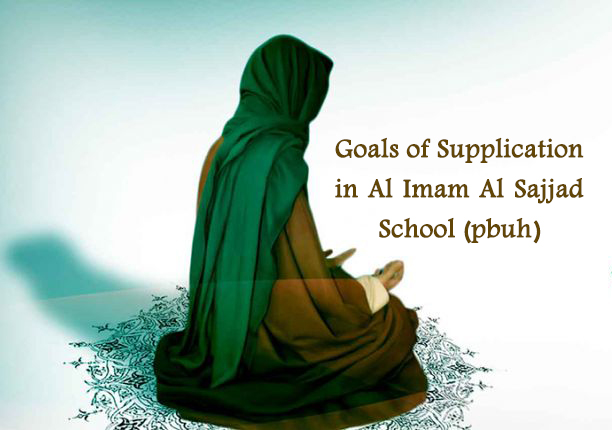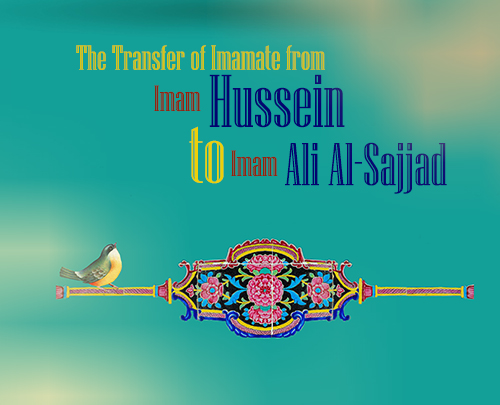Characteristic behaviors of Imam Sajjad(AS) and how we can implement His model in the resolution of today's major issues.
Introduction:
Throughout history, Allah has appointed many prophets to guide humanity through a straight path by revealing and explaining Allah's laws. Each prophet was also given the task to preach the oneness of God, to invite people to obey Allah's laws, and to be honest and pious.
Allah's laws, revealed through his prophets, became the norms and rules by which the community was to be governed. With Prophet Muhammad (p.b.u.h) the line of prophecy came to an end and revelation was complete.
Islam was the culmination of all previous divine religions. So where do the Imams come into the picture? After the death of the Prophet Muhammad (p.b.u.h), there was a need to make sure that Islam remained protected and secure and that its divine message and moral principles would reach those who had not been fortunate to hear it directly during the life of the Prophet. There was also a need to represent and explain Islam correctly. Imams were those who were entrusted with this mission.
The term "Imam" refers to a leader who is sinless and possess divine knowledge of the Quran. Only Shiah's believe in the institution of Imamate The Shi'ites are a sect of Muslims who believed that Imam Ali (AS), cousin and son in law of the Prophet Muhammad (p.b.u.h), was the rightful successor after the passing of the Prophet (p.b.u.h). They believe that there are 12 Imams in the line of the Imamate with Imam Mahdi (AS) being the twelfth Imam.
They believe that Imam Mahdi (AS) went into occultation in the year "879 AH" and has not been seen since. According to Shiates belief, he will return and will establish justice and righteousness to the world at a time when it is filled with tyranny and oppression.
Discussion:
The forth Imam, AH bin Husayn (AS) known as Imam Zaynul-Abideen, was born in Medina on the 5th of Shaban 38 AH. His father is Imam Husayn bin Ali (AS) and his mother Bibi Shabanu, daughter of the Persian King, Yazdegerd II. The last Sasanian Emperor of Iran. According to some accounts, his mother was brought as a captive to Medina during the caliphate of "Umar", who wanted to sell her.
Immam Ali (AS) suggested instead that she be offered her choice of the Muslim men as husband and her dower be paid from the public treasury. "Umar agreed and she choose Imam Ali's (AS) son Husyan (AS). She is said to have died shortly after giving birth to her son Ali bin Husayn (AS).
"His title Zaynul-Abideen was granted to him by the Holy Prophet Muhammad (p.b.u.h). His other Title, Syed-us-Sajideen, was given to him by people because of his devotion to prayers. He would pray for long durations especially during the nights. Imam Sajjad( a-s) spent the first 2 years of his life under the care of his grandfather Imam Ali (AS). After Immam Ali's (AS) death in 40 A.H., he was brought up under the care of the 2nd Imam Hasan (AS).
Imam Saiiad (AS) was married to Bibi Fatima fa-s) daughter of Imam Hasan (AS) Imam Hasan (AS) was martyred in 50 A.H. and the Imamate of Imam Husayn (AS) his younger brother, started right after his martyrdom. Imam Husayn (AS) was also martyrdom on 10th Moharram 61 A.H. from where the Imamate of Imam Sajjad (AS) began.
Immam Zaynul-Abideen (AS) was about 22 years old when the sad event of Karbala occurred. Imam survived the massacre of Karbala only because he was unable to go to the battlefield due to sickness. "He asked the permission to fight in the battle but his father, Imam Husayn (AS), told him that he had been assigned a different type of "Jihad" that was to start after his martyrdom."
However, on the next day after the bloody battle of Karbala he was hand tied, put in shackles, and was forced to march on foot from the battlefield, first to Kufa and then to caliph in Damascus and eventually he was allowed to return to Medina. On this journey of painful suffering, his aunt Hazrat-e Zainab (AS), the sister of Imam Husayn (AS) and other surviving widows and children, accompanied him.
In Madina, Imam (AS) gathered the people and told them the horrifying stories of Karbala and informed them that his father Imam Husyan (AS) and his companions were martyred and his family members were made prisoners and were taken from one city to another and branded as traitors. Day in and day out, people used to go to Imam (AS), present their condolences and hear the events of Karbala.
Once a visitor asked him how long would he continue mourning and crying He replied that Prophet Ayub (AS) had 12 sons and only one of them was lost and although he knew that he was still alive he continued crying until his eyes became white and his back was bent. Imam added that I had seen my father, and 17 members of my family being slaughtered around me like sheep and you ask me as to how long I would continue mourning!
After the martyrdom of Imam Husayn(AS), the survival of Islam depended on Imam Zaynul-Abideen (AS), at the age of 22 had a very hard task of letting the world know the mission of Imam Husyan (AS) and exposing the evil intentions of Yazid and the Bani Umayyad and keep the message of Islam alive.
"Many Shi'ites, such as those involved in the " Tawwabun" movement, felt that the Umayyads had to be overthrown and that it was the duty of the Imam to lead a revolt. But Imam Zaynul-Abidin himself refused to become involved with politics". The Imam (AS) had a handful of faithful followers such as Abu Hamza Thamali and Abu Khalid Khabuli.
He was responsible for establishing the book Al-Sahifa-A-E-Kamila It is also know as Al-Sahiffa Sajjadiyah, the book of supplications, together with his aunt, Hazrat Zaynab binti AH, (AS) they narrated the tragedy of Karbala and what had happened to the family of the Holy Prophet Muhammad (p.b.u.h).
The Imam finally achieved the status of martyrdom when he was poisoned by Hisham, brother of Abd al-Malik in the year 95 A.H. (713/4). At that time he was fifty -seven years old. His Imamate lasted thirty-four years. He was buried in Jannatull-Baqi. Before his death, the Imam called his son Muhammad and entrusted the responsibility of the Imamate to him. "Although his son Muhammad al-Baqir (AS) fulfilled the needs of the believers by carrying out the functions of his assignment with spectacular brilliance, the painful death of his father left a void in the lives of his companions".
Conclusions:
The important role played by Imam Zaynul-Abidin As-Sajjad (AS) was to keep Islam and its divine mission alive, and practicing and preaching the true Islam. Life for Imam Zaynul-Abidin (AS) was so difficult. "He truly lived everyday as Ashura and every place he went, the land for him was Karbala".
However, he showed nothing but patience, piety, the highest of moral and ethical conduct and continued to be the living example of sacrifice in the path of Allah.
During the prayers he would be so involved with his faith and devotion to Allah that nothing else would matter to him.
He traveled to Macca, on foot, twenty times and continuously guided and conducted people through the melody of the Qur'anic verses. All the cherished human qualities, such as tolerance, forgiveness, and self-sacrifice, were collectively present in his personality.
People remembered Imam Zaynul-Abidin (AS) for his patience and sufferings he had to endure throughout his life.
He was the object both of great sympathy because of the massacre of his family and for being great grandson of the Prophet (p.b.u.h). He dedicated his life to learning and worship and became an authority on prophetic traditions and law, but he was known mostly for his nobility character. During the reign of the Umayyad, Muslims were severely restricted in their freedom of expression and in their method of worship. Corruption and injustice were prevalent under the Umayyad.
People had to obey their wishes and follow their rules or face severe punishments including death. Such laws or (innovation) mostly violated Islamic teachings but people become so frightened that they had to comply. The Umayyad made a serious effort to make people ignore the Ahlul Bayt and forget the tragedy of Karbala but neither the Ahlul Bayt nor the Muslim community compromised their faith or abandoned their struggle to overthrow the Umayyad. It is because of the revolution of Imam Husyan (AS) that we are still Muslims and know about the Ahlul Bayt (AS).
Gatherings in which the Ahlul Bayt (AS) are remembered and their messages discussed have been widespread events since the Karbala tragedy. These gatherings help us to understand and realize the important message behind their revolution. It is for the generation of today to reflect and ponder the reality of life, ask ourselves "Who are we?" and "Why are we here?" The world is but a transition and just like the Holy Imam Husyan (AS) sacrificed his family and friends for Islam, we need to realize what our roles are and start performing it.
Few quotes from Imam Sajjad (AS):
- "Think of the might of God the All Mighty over thee and be bashful for His closeness to thee."
- "The kind and affectionate looking of a Mo'men (true-believer) at his Mo'men brother is considered as a worship."
- "He who attributes to people what is in their nature will be attributed to the ones which is not owned by him."
* Striving for Right Guidance, by Dr. Muhammad al-Tijani al-Samawi A Shi'ite Encyclopedia.
Ahl-al-Rayt ('a): Its Meaning and Origin,Translated by TVT Jalali
Mehrang Nejad, Canyon High School , Orange , CA 92867


















